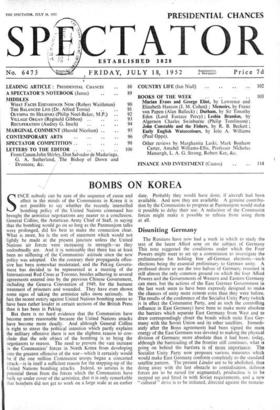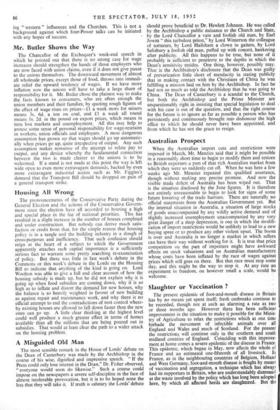Disuniting Germany
The Rtissians have nOw had a week in which to study the text of the latest Allied note on the subject of Germany This note suggested the conditions under which the Four Powers might meet to set up a commission to investigate the preliminaries for holding free all-German elections—such elections being the essential preliminary to German unity. A professed desire to see the two halves of Germany reunited is still almost the only common ground on which the four Allied Powers and the Governments of Western and Eastern Germany can meet, but the actions of the East German Government in the last week seem to have been expressly designed to make the chances of unity more remote even than they were before. The results of the conference of the Socialist Unity Party (which is in effect the Communist Party, and as such the controlling influence in East Germany) have been to make more absolute the barriers which separate East Germany from West and to draw correspondingly closer the bonds which unite East Ger- many with the Soviet Union and its other satellites. Immedi- ately after the Bonn agreements had been signed the main energy of the East Germans was devoted to making the physical division of Germany more absolute than it had been; today, although the barricading of the frontier still continues, what is going on behind the barriers is of more importance. Tho Socialist Unity Party now proposes various measures which would make East Germany conform completely to the standard satellite pattern. The present Lander are to be abolished, thus doing away with the last obstacle to centralisation, defence forces are to be raised (or augmented), production is to be stepped up and fitted in with Soviet requirements, and a new " cultural " drive is to be initiated, directed against the remain- ing " western " influences and the Churches. This is not a background against which four-Power talks can be initiated with any hopes of success. •



































